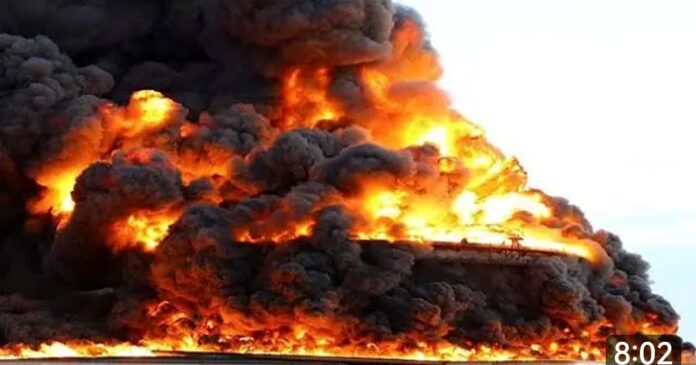A Flame Divided: The Paradox of Cooperation Amidst Conflict
In the heart of a parched landscape, where the sun beats down mercilessly and the earth crumbles beneath the weight of age-old grievances, a wildfire rages. Its flames leap hungrily, consuming everything in their path, indifferent to the lines drawn on maps or the histories etched in hearts. This is not just a battle against nature; it is a tragic metaphor for a deeper conflict—one that has simmered for decades, fueled by hatred and political hostility. The Israeli-Palestinian conflict, with its complex tapestry of narratives, has reached a point where even the most basic humanitarian impulses are overshadowed by animosity.
When the wildfires broke out, the air was thick with smoke and despair. The flames, wild and uncontrollable, threatened not only the landscapes but the lives of those residing in their vicinity. As the fire spread, the Israeli government found itself at a crossroads. On one side lay the stark reality of destruction, the urgent need for assistance, and the possibility of saving lives. On the other, the entrenched animosity that has defined the Israeli-Palestinian relationship—a barrier that seems insurmountable, even in the face of a shared threat.
The Palestinian authorities in the West Banc, aware of the impending disaster, offered their assistance. They extended a hand, not as adversaries but as neighbors facing a common peril. Their firefighters were ready, equipped with experience and determination, eager to help quell the flames that threatened both their communities. Yet, the response from the Israeli government was one of rejection. The refusal was not merely a denial of aid; it was a testament to how deep-seated hatred can blind leaders to opportunities for cooperation.
This tragic dynamic is not merely a political failure; it is a human one. It speaks to the heart of what it means to live in a world where animosity overshadows empathy. The wildfires, in their indiscriminate destruction, serve as a poignant reminder of the fragility of life and the interconnectedness of all who inhabit the land. Yet, in this moment of crisis, the opportunity for collaboration was sacrificed on the altar of longstanding grievances.
Imagine, for a moment, what could have been. Picture firefighters from both sides, united in purpose, working side by side to combat the flames. The crackle of the fire would be drowned out by the sound of shared determination, the roar of engines, and the laughter of those who recognize the absurdity of their divisions in the face of nature’s fury. In this imagined scenario, the fire becomes a catalyst for change—a moment where the barriers of hatred begin to crumble, revealing the humanity that lies beneath.
But reality often diverges sharply from our hopes. Instead of cooperation, the flames of the wildfire became a backdrop for the embers of distrust. The rejection of Palestinian assistance was not merely about the fire; it was a manifestation of a deeper ideological struggle, a refusal to acknowledge the humanity of the other. It reinforced the narrative that cooperation is impossible, that the two communities are destined to remain adversaries, even in the face of a common enemy.
The wildfires, in their destructive path, illuminated a critical truth: the greatest threat is not the fire itself, but the inability to see beyond the flames. The refusal to accept help was a reflection of a broader societal ailment—one where political leaders prioritize their narratives over the lives of those they govern. In a world where cooperation could lead to healing, the flames of division continue to burn brightly.
Yet, amid the ashes of despair, there lies a glimmer of hope. The very act of offering assistance, even in the face of rejection, speaks to a resilience that transcends politics. It is a reminder that the desire for connection, for solidarity, persists even in the darkest of times. The Palestinian firefighters, despite being turned away, demonstrated an unwavering commitment to their neighbors, a willingness to put aside grievances for the sake of humanity.
As the smoke cleared and the flames were eventually extinguished, the question remained: what lessons would be learned? Would the leaders of both communities reflect on this moment of crisis and recognize the potential for collaboration? Or would they allow the embers of hatred to reignite, perpetuating a cycle of animosity that has defined their existence for far too long?
In the end, the wildfires serve as a poignant reminder of the fragile nature of life and the urgent need for empathy. They challenge us to confront the narratives that divide us and to seek out moments of connection, even when it seems impossible. The refusal to accept help in the face of disaster is a tragedy not just for those directly affected, but for all of humanity. It is a call to action, urging us to rise above our divisions and embrace the shared responsibility we have for one another.
In a world where flames threaten to consume us, let us not forget that the greatest fire of all is the one that burns within our hearts—the fire of hatred. It is time to extinguish its flames and nurture the embers of cooperation, compassion, and understanding. Only then can we hope to forge a path toward healing and reconciliation, transforming the landscape of conflict into one of hope and unity. Having witnessed the bitter reality, time has come to accept the two state 1967 solution with a divided capital-Jeruslam.




